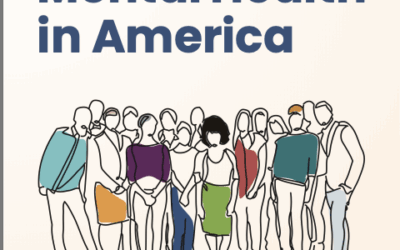(Information as of 2/25/17, subject to change*)
The recently completed legislative session took place in the shadow of news about Virginia’s mental health care problems. With publicized deaths in Virginia jails, an epidemic of fatalities due to heroin overdoses and a national Mental Health America ranking of 38th in access to mental health services, the public and stakeholders alike were advocating for meaningful change. Fortunately, the Governor and the legislature agreed on many actions to improve our system of behavioral health care. The Governor proposed over $30 million in additional funding at the start of the session, and members of the Joint Legislative Subcommittee to Study Mental Health Services and others put forward several bills to improve mental health services.
System Analysis/Financial Realignment
Compared to most other states, Virginia spends a much higher percentage of its mental health care dollars on institutional care than on community care (We spend just over half of the national average for mental health care in the community). The Governor had included $4.5 million in his budget for the Secretary of Health and Human Resources to contract with consultants to conduct a Statewide Gap Analysis and implementation plan for a transformed Mental Health Care System. The legislature instead stated its intent to transform the system of care into a model that embodies best practices and state-of-the art services by treating, where appropriate, individuals in the community. Lawmakers allocated $250,000 to the Secretary of HHR to prepare an implementation plan for the financial realignment of Virginia’s public behavioral health system. It also gave $250,000 to the SJ47 Subcommittee.
Joint Subcommittee for Study of Mental Health Care in the 21stCentury
(aka: SJ47 Subcommittee; Deeds Commission)
Several of the legislative and budgetary changes initiated this year were related to recommendations from this subcommittee, which has been studying mental health care for the past few years. The subcommittee was to complete its work by the end of this year, but there is more to do so the legislature continued it until December 1, 2019. Some bills that failed to pass this year were recommended to be studied by the subcommittee, including the issues of private registries for available psychiatric beds, de-escalation and mental health training for first responders and jail officers, and the financial and structural realignment of the state’s mental health system (already under review). As noted above, an additional $250,000 was approved to fund work of the subcommittee.
Community Services Boards – Core Services to be provided
Both the Governor and the Deeds Commission supported the Commissioner’s plan to expand the core services required of all 40 local CSBs. Currently only emergency services and, subject to the availability of funds, case management services are required. Other services are added and funded in varying degrees by localities. The result is a wide variation in access to services throughout the state. The legislation that passed took a phased in approach, adding “Same Day Access” as a required service, and also adding screening for need of primary health services and access to primary care providers and follow-up. The enactment for this change is effective July 1, 2019.
Under a pilot project, a few local Community Services Boards have already begun implementing “Same Day Access,” or an initial screening for people the same day they ask for help. The results are significant in starting services more quickly to provide help. The Governor’s proposed budget allocated $8.2 million to implement “same-day access” to 25 of the 40 CSBs. The legislature reduced that to $6.2 million.
The other core services to be provided, effective July 1, 2021, are:
- crisis services for mental health or substance use disorders,
- outpatient mental health and substance abuse services,
- psychiatric rehabilitation services,
- peer support and family support services,
- mental health services for members of the armed forces located 50 miles or more from a military treatment facility and
- mental health services for veterans located 40 miles or more from a Veterans Health Administration medical facility,
- care coordination services,
- case management services.
The Department of Behavioral Health is to provide a progress report on implementation to the General Assembly by December 1st of each year.
Jail/Institutional Issues
Several bills were passed to improve how local and regional jails work with people in their custody.
- HB2184 requires that the jail having custody of an inmate ordered for mental health evaluation is responsible for ensuring they actually receive it.
- HB1996 requires inmates ordered to inpatient treatment to be transferred ASAP and no later than 10 days from when the order was issued.
- HB1784/SB941 requires the Dept. of Behavioral Health, in conjunction with stakeholders, to develop a plan by November 1, 2017 for discharge planning services at local regional jails for persons who have a serious mental illness.
- HB2183 requires the Dept. of Medical Assistance Services and a stakeholder work group to develop a process for streamlining the Medicaid enrollment process so that eligible people being released from incarceration can access coverage immediately upon release.
- HB1782/SB1063 specifically authorizes the state Board of Corrections to investigate deaths of inmates in local or regional jails. It requires members of the Board to have specific expertise in areas related to mental health and investigations, and through a compromise provides $100,000 for designated staff, plus access to staff from the Department of Corrections if needed, and to resources of the Office of the State Inspector General if an investigation leads to agencies in addition to the jail facility.
- Due to the projected cost, bills failed to pass that would have required standardized mental illness assessment tools at all Virginia’s jails, and to require an assessment by a qualified mental health professional within 72 hours if an inmate was assessed as having a mental illness. The Governor had included $4.2 million for additional staff to conduct the evaluations, which was not adopted by the legislature. However, budget language adopted by the conference committee does require jails to use a standardized jail mental health screening instrument, and directs the Compensation Board to review its jail staffing standards and report on the cost/benefits of requiring every jail to conduct an assessment within 72 hours of the initial screening. The report is due by October 1, 2017.
- HB1508 is not related to jails, but does address incidents in mental health/disability group homes and similar facilities. It requires a written report on critical incidents or deaths of individuals receiving services in programs operated or licensed by the Dept. of Behavioral Health within 15 days. Currently, reports are required only for incidents or deaths occurring at the facilities operated directly by the Department.
GAP Program
Budget language provides $2 million and expands eligibility for adults with serious mental illness in the Medicaid GAP (Governor’s Access Program) from 80 to 100 percent of the federal poverty level effective October 1, 2017. It increases the scope of services covered to include recovery and treatment services, including partial day hospitalization and residential treatment. Increasing the eligibility up to 100% will allow several thousand more uninsured adults with mental illness to receive access to basic mental health and primary care services.
Supportive Housing
The Conference Report includes an additional $4.9M to fund permanent supportive housing in Fiscal Year 2018. These funds will expand current efforts to provide permanent supportive housing for people with a serious mental illness. The Deeds Commission had recommended $10 million because this funding has such a great cost-benefit result. On any given day more than 100 people in state hospitals who have been clinically approved for discharge remain in the hospital because there is no place for them to live in the community. Supportive housing helps prevent homelessness, re-hospitalization and incarceration. The Department of Housing and Community Development is to develop strategies to house additional people with serious mental illness and report annually to the legislature.
Other Mental Health Related Issues
- HB1426 requires the Department of Behavioral Health to convene a working group to develop a model for Alternative Transportation(e.g. using a private provider instead of uniformed law enforcement) in the emergency custody or involuntary admission process. MHAV is specifically included as a member of the working group.
- HB1767/SB1009 provides for greater use of Telemedicine (including Telepsychiatry).
- HB1548/SB1511 provides more flexibility for those choosing to have Advance Directives for Mental Health Care.
- HB2095/SB1020 provides for registration of Certified Peer Recovery Specialists and Qualified Mental Health Professionals with the Board of Counseling. This is needed in order for agencies employing these professionals to be reimbursed by Medicaid for their services.
*The above information consists of major highlights and is not comprehensive of all behavioral health related legislation. Some items are explained as they are understood by MHAV as of 2/25/17. Some bills are still awaiting review and signature by the Governor. The legislature will reconvene April 5th to consider any items vetoed by the Governor.



